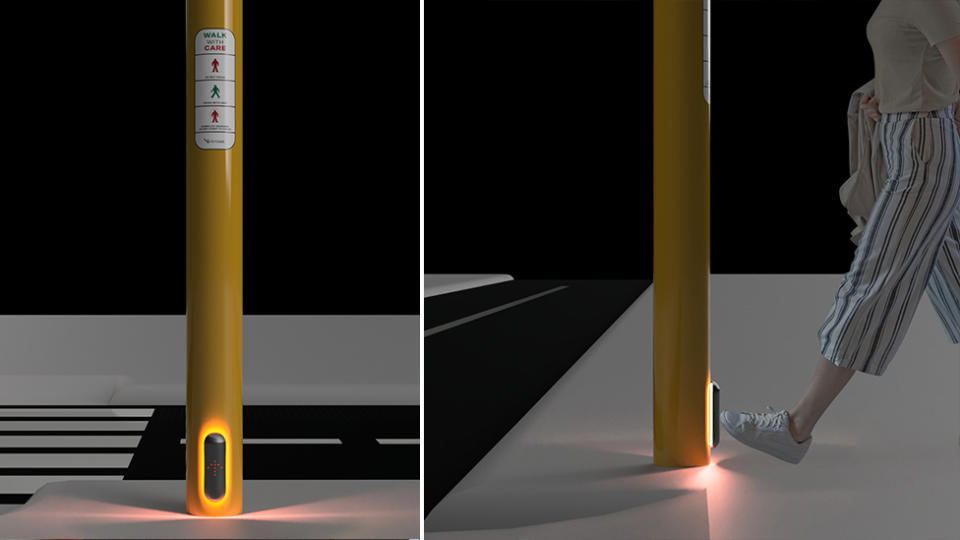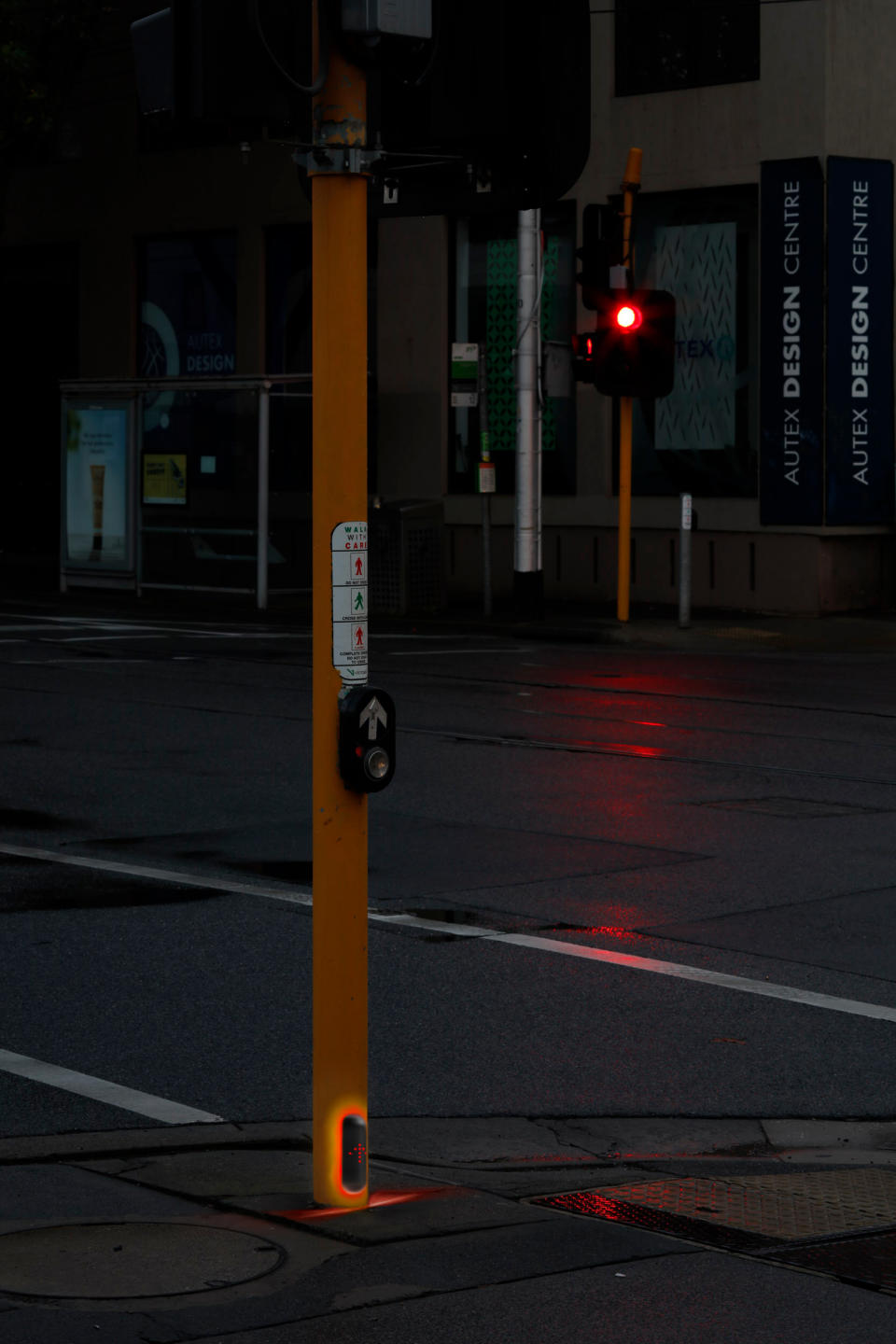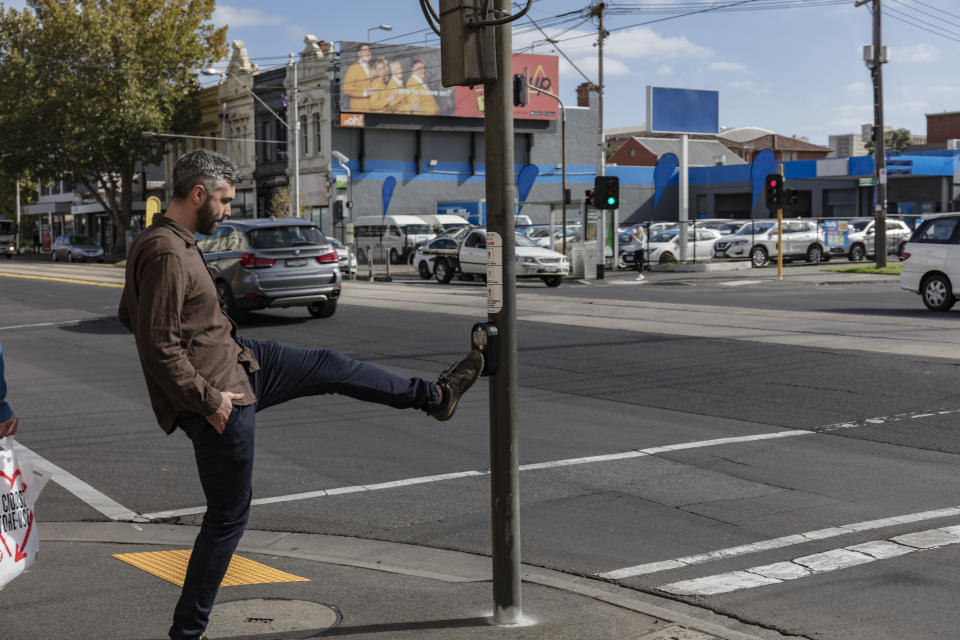The innovative gadget set to change how we cross the road
Yahoo News Australia's Life After Lockdown series investigates what life will be like after coronavirus restrictions.
Due to the spread of the coronavirus, people are more cautious than ever about their own hygiene and touching potentially contaminated surfaces.
While most of Australia’s capital cities made pedestrian crossings automated amid the pandemic, some people just like pressing those buttons, sometimes repeatedly under the delusion you’ll get across the road faster.
Thinking of how Australia can evolve post-COVID-19, Foreward, a research and solutions focused initiative of Greenpoint Media and One Design, has come up with hands-free pedestrian crossing button called Dropkick – an alternative to PB/5 buttons have been standard across Australia since 1984.

Dropkick would be added to exisiting host traffic poles, which would be backlit with a halo that doubles as a light indicator, which caters to pedestrians who look down at their phones while waiting.
Head of Design at Foreward, Jon Liow, told Yahoo News Australia it was through observing the habits of pedestrians that spurred the concept for Dropkick, which allows people to hit the button, not with their hands, but their feet.
“It was just this idea of, why do we have to keep pressing it with our hands? Isn’t there a better way?” Mr Liow said, adding people generally aren’t afraid to get their feet, or shoes dirty.
“Studies have shown that these buttons are a breeding ground for bacteria and on any given day, hundreds, if not thousands, of individuals will touch it.”
While automated pedestrian crossings may be a good idea for the time being, Mr Liow says the problem with those is sometimes people will have to wait “unnecessarily long times” to cross the road when there aren’t any cars around.
The idea was to revitalise the traditional buttons, in a “simple manner” and make it safe for people to use.
Mr Liow said some pedestrian crossings around the world use weighted pads to determine when a pedestrian is standing waiting to cross the road.
'Early mark': PM hints at easing coronavirus restrictions sooner
Coronavirus: What you can and can’t do under new visiting rules
But Mr Liow says the automated systems have their downfalls – weighted pads in particular can be expensive to install in Australia and some automated crossings will sometimes trigger when no one is waiting to cross the road.

“Our thought was this button could actually be sought in conjunction with the existing PB/5 buttons,” he says.
“It could be an option for intersections, as it just offers that added efficiency of not having to stop traffic unnecessarily and not requiring extensive construction work to actually install it into the existing locations.”
Mr Liow did say there has been talk about how this design could work for people in wheelchairs or elderly people.
“I guess this is an interim solution to a long-term fix,” he explains.
“In the future there may be a lot more digital integration into traffic management.”
He adds the Dropkick button could be used in-conjunction with exisiting technology, while the team continues to think about the future of cities in Australia.
“Yes there are a lot of Jetson-style solutions out there, but what’s maybe more realistic, a step by step approach to get towards those ideals.”
The coronavirus will most likely change the way we function as a society, not only in terms of social distancing, but also how we conduct our daily lives and offer ideas to solve problems.
Mr Liow explained Foreward was actually born during the coronavirus and the team is now looking at further ways to enhance the daily lives of Australians through innovation.
🚫 You don't need to press pedestrian crossings buttons in the @CityofAdelaide. All crossings are now set to automatic. pic.twitter.com/WUJMi4ermm
— Sandy Verschoor (@sandyver) March 24, 2020
“Coming out of COVID, we see there being so many changes to the future – how people travel, how people work, how commercial office spaces are leased and what’s happening with retail spaces,” he explains.
“Foreword was birthed in the last couple of weeks out of this desire to try and brainstorm solutions to bigger problems, but also offer it as a think tank to parties that maybe need a design thinker or need someone on board who can help them come up with innovative strategies to new problems that they’re facing.”
Right now Foreward is open to partnering with groups to bring the design to life as it’s just exisiting as a “concept design” for the team.

“We are trying to reach out to a few parties to see how this could be furthered, whether that’s councils or government,” Mr Liow said, adding he is eager to hear from anyone who thinks they might be able to partner with the think tank.
Of course, Dropkick could also be beneficial to people who have the urge to continually hit the button while waiting by the road.
“There are placebo buttons everywhere that exist for the sole purpose of human gratification and we suspect that there could not be a replacement for the tactility of a physical button, so why not make them hands-free and ultimately, more hygienic?” Mr Liow said.
Do you have a story tip? Email: newsroomau@yahoonews.com.
You can also follow us on Facebook, Instagram and Twitter and download the Yahoo News app from the App Store or Google Play.






